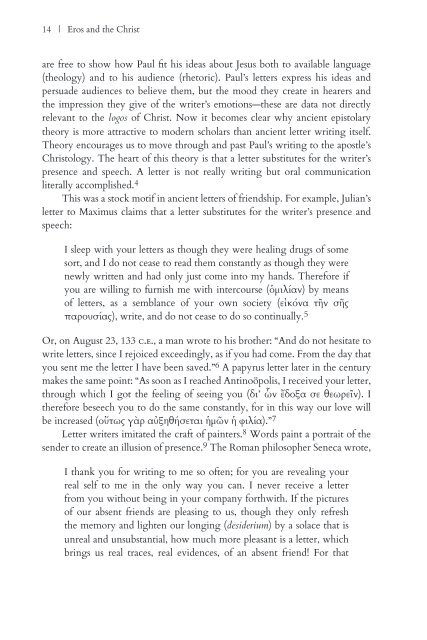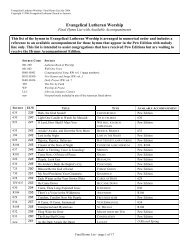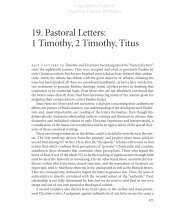Chapter 1 - Augsburg Fortress
Chapter 1 - Augsburg Fortress
Chapter 1 - Augsburg Fortress
Create successful ePaper yourself
Turn your PDF publications into a flip-book with our unique Google optimized e-Paper software.
14 | Eros and the Christ<br />
are free to show how Paul fit his ideas about Jesus both to available language<br />
(theology) and to his audience (rhetoric). Paul’s letters express his ideas and<br />
persuade audiences to believe them, but the mood they create in hearers and<br />
the impression they give of the writer’s emotions—these are data not directly<br />
relevant to the logos of Christ. Now it becomes clear why ancient epistolary<br />
theory is more attractive to modern scholars than ancient letter writing itself.<br />
Theory encourages us to move through and past Paul’s writing to the apostle’s<br />
Christology. The heart of this theory is that a letter substitutes for the writer’s<br />
presence and speech. A letter is not really writing but oral communication<br />
literally accomplished. 4<br />
This was a stock motif in ancient letters of friendship. For example, Julian’s<br />
letter to Maximus claims that a letter substitutes for the writer’s presence and<br />
speech:<br />
I sleep with your letters as though they were healing drugs of some<br />
sort, and I do not cease to read them constantly as though they were<br />
newly written and had only just come into my hands. Therefore if<br />
you are willing to furnish me with intercourse (ὁμιλίαν) by means<br />
of letters, as a semblance of your own society (εἰκόνα τῆν σῆς<br />
παρουσίας), write, and do not cease to do so continually. 5<br />
Or, on August 23, 133 c.e., a man wrote to his brother: “And do not hesitate to<br />
write letters, since I rejoiced exceedingly, as if you had come. From the day that<br />
you sent me the letter I have been saved.” 6 A papyrus letter later in the century<br />
makes the same point: “As soon as I reached Antinoöpolis, I received your letter,<br />
through which I got the feeling of seeing you (δι’ ὧν ἔδοξα σε θεωρεῖν). I<br />
therefore beseech you to do the same constantly, for in this way our love will<br />
be increased (οὕτως γὰρ αὐξηθήσεται ἡμῶν ἡ φιλία).” 7<br />
Letter writers imitated the craft of painters. 8 Words paint a portrait of the<br />
sender to create an illusion of presence. 9 The Roman philosopher Seneca wrote,<br />
I thank you for writing to me so often; for you are revealing your<br />
real self to me in the only way you can. I never receive a letter<br />
from you without being in your company forthwith. If the pictures<br />
of our absent friends are pleasing to us, though they only refresh<br />
the memory and lighten our longing (desiderium) by a solace that is<br />
unreal and unsubstantial, how much more pleasant is a letter, which<br />
brings us real traces, real evidences, of an absent friend! For that




